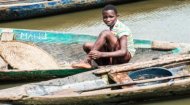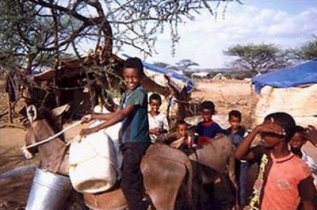|
|
|
|
Life in Eritrea |
Life in Eritrea |
Life in Eritrea | Life in Eritrea |
Explore
all about the east African country of Eritrea in a series of profiles in pictures, videos
and images.
More >
 |

However, after he left power in the 1990s, political stability has provided a footing for a reformation of the country with the privatisation of many loss making state run institutions. Uranium exports are also helping to boost export earnings in a move away from reliance on foreign humanitarian aid.
Despite this there has been some progress in Eritrea. Some 40,000 orphans have been placed back within their extended families from institutionalised orphanages. Eight thousand disabled children have left institutions to be cared for at home whilst a further 3,500 children have been integrated into mainstream schools. Over 16,000 street children have been brought within the educational framework and the deaths rates of children from malnutrition have halved in recent years. However Eritrea remains one of the world's least developed countries and is in 176th place out of 191 countries and territories in 2021 when ranked in terms of life expectancy, literacy, access to knowledge and the living standards of a country. |




 The country responded by suspending its membership of the African Union in protest denounced the organisation as 'a lapdog of USA imperialism' causing further isolation. Others, however, claim that the outside world's image of Eritrea is unfair and plays down the progress the country has made, particularly over the past ten years stating that opponents of the government of Eritrea are simply supporting a political agenda of regime change. As with many other countries inside the Horn of Africa, access to safe water in a major issue in Eritrea, particularly in rural communities. The country has only one river that flows all year, the Setit River, so most are reliant on boreholes. Of the 5,365 known boreholes about 3,374 offer unprotected water and a further 1,233 are known to be contaminated leading to a prevalence of waterborne diseases including bacterial diarrhoea, Hepatitis A and typhoid fever.
The country responded by suspending its membership of the African Union in protest denounced the organisation as 'a lapdog of USA imperialism' causing further isolation. Others, however, claim that the outside world's image of Eritrea is unfair and plays down the progress the country has made, particularly over the past ten years stating that opponents of the government of Eritrea are simply supporting a political agenda of regime change. As with many other countries inside the Horn of Africa, access to safe water in a major issue in Eritrea, particularly in rural communities. The country has only one river that flows all year, the Setit River, so most are reliant on boreholes. Of the 5,365 known boreholes about 3,374 offer unprotected water and a further 1,233 are known to be contaminated leading to a prevalence of waterborne diseases including bacterial diarrhoea, Hepatitis A and typhoid fever. Today Eritrea is an impoverished nation, with around 80% of its population reliant upon subsistence farming although just 6.8% of its land is arable, despite its abundance of resources including gold, potash, zinc, copper, salt, and fish. Natural events have also played their role in preventing the country from development, with poor rainfalls affecting harvests to the point where the country is unable to grow enough foods to meet its populations needs. Abject poverty, drought, famine and instability are the conditions into which children in Eritrea are born.
Today Eritrea is an impoverished nation, with around 80% of its population reliant upon subsistence farming although just 6.8% of its land is arable, despite its abundance of resources including gold, potash, zinc, copper, salt, and fish. Natural events have also played their role in preventing the country from development, with poor rainfalls affecting harvests to the point where the country is unable to grow enough foods to meet its populations needs. Abject poverty, drought, famine and instability are the conditions into which children in Eritrea are born.


